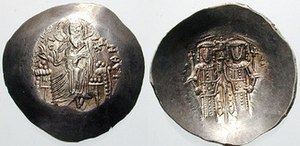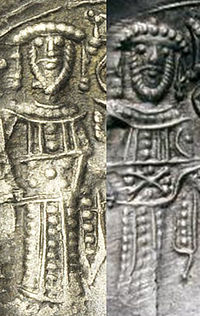Alexios III (Byzantium)

Alexios III Angelos ( Middle Greek Ἀλέξιος Γʹ Ἄγγελος ; * around 1160; † 1211 or later in Nicea ) was Byzantine emperor from 1195 to 1203. He was the second son of General Andronikos Angelos and thus great-grandson of Emperor Alexios I Komnenos . Even if Alexios III. Angelos himself had the second epithet Komnenos ( Κομνηνός ), he was not accepted as a Komnenos by the Byzantine nobility .
Life
Elevation to Emperor
When his brother, the then emperor Isaac II , was on a campaign against the Bulgarians in 1195 , Alexios III. proclaimed emperor by the troops. He had his brother captured, blinded and thrown in jail.
The crime against his brother, his strong extravagance and the lack of authority of the new emperor, who as Angelus could not rely on strong domestic power, led to uprisings and usurpation attempts. The result was an almost galloping decline in power until the eve of the Fourth Crusade it was only a shadow of itself.
The Empress Euphrosyne tried in vain to take corrective action in government affairs. Their efforts ended abruptly when the emperor had their advisor Vatatzes, who was allegedly also her lover, murdered and banished the empress to the monastery of Nematarea on the Black Sea coast.
In the east, the empire was threatened by the Seljuks at that time . In the north, the Bulgarians and Wallachians invaded the Macedonian and Thracian plains in 1195/96 , while Alexios squandered the state treasure on his palaces and gardens. The German Emperor Heinrich VI threatened a particular danger . , who received the Sicilian crown at Christmas 1194 by virtue of his marriage to Constance of Sicily and thus replaced the Normans in Sicily. In the Norman tradition, he immediately put pressure on Byzantium and asked the Byzantine emperor to support his crusade by paying an annual payment of 1,600 pounds of gold. Alexios III had to introduce a special tax called Alamannikon due to the empty state treasury and rob the imperial tombs of the Apostle Church of their valuable jewelry in order to be able to pay the tribute and to avert the German-Norman threat. This increased the unpopularity of Alexios III. in the people to a high degree.
Fourth crusade
Soon Alexios was threatened by a new danger: in 1202 the European princes of the Fourth Crusade had gathered in Venice . His nephew, son of the deposed Isaac II , who also bore the name Alexios, fled Constantinople and appealed to the Crusaders. He promised them the lifting of the Oriental Schism between the Catholic and Orthodox Churches , large sums of money and participation in the crusade if they would help him to depose his uncle.
The crusaders, whose goal was actually Egypt , were finally convinced to support the son of the deposed Isaac II on the basis of high promises due to the high debt pressure against Venice , appeared in June 1203 in front of Constantinople and demanded Alexios III. to resign. Since Alexios III. did not want to abdicate without further ado, the claims to the throne of his nephew - the future emperor Alexios IV - had to be enforced militarily.
On July 17, 1203, the crusaders, led by the aged Doge Enrico Dandolo , succeeded in breaking through a weak point in the city, which had been undefeated since the construction of the Theodosian Wall (413), namely the comparatively lightly fortified sea wall to the Golden Horn. However, the Venetians withdrew from the conquered section of the wall after setting fire in the neighboring districts. Although the situation seemed anything but hopeless, Alexios III fled. with his favorite daughter Irene and part of the state treasury to Thrace. He left the rest of the family behind. With this the resistance of the besieged collapsed. The blind Isaac II, imprisoned since his disempowerment, was put back on the throne by the Byzantines and his son Alexios IV finally also received the crown.
After a revolt in early 1204, Alexios Murtzuphlos , a son-in-law of Alexios III, ascended the throne as Alexios V for two months. After he had Alexios IV strangled and Isaac II poisoned, he stopped all payments to the crusaders encamped in front of Constantinople and instructed them to leave his kingdom immediately.
This led to the actual conquest and sacking of Constantinople in April 1204, which ended with a terrible wave of looting in which many residents were killed and centuries-old art treasures were stolen, valuable icons and mosaics were destroyed and dozens of relics of all kinds were stolen.
Alexios V fled to his father-in-law Alexios III. But Alexios III. blinded him and handed him over to the crusaders, who sentenced him to death and fell from the Column of Theodosius .
Life in exile
Alexios III finally surrendered together with Euphrosyne , who had meanwhile reunited with him, Boniface of Montferrat , who ruled over the newly founded Latin kingdom of Thessaloniki . He later sought protection from Michael I Angelos , despot of Epirus , and then turned to Asia Minor , where his son-in-law Theodor Laskaris offered Byzantine resistance against the Latins in the newly founded exile empire Nikaia .
Alexios III, supported by Kai Chosrau I , the Sultan of Rûm (also called Sultanate Iconion), demanded the crown from Theodor and turned against him when he refused. Theodor succeeded in defeating Kai Chosrau I in the Battle of Antioch on the Meander and Alexios III. to capture. Alexios III was imprisoned in a monastery near Nicaea , where he died at an unknown date.
literature
- Ralph-Johannes Lilie : Byzantium - The second Rome . Berlin 2003, ISBN 3-88680-693-6 , p. 432ff.
- Ljubomir Maksimović: Alexios III. Angelos . In: Lexicon of the Middle Ages (LexMA). Volume 1, Artemis & Winkler, Munich / Zurich 1980, ISBN 3-7608-8901-8 , Sp. 386.
- John Julius Norwich , Byzantium: Decline and Fall, 1071–1453. Translated from the English by Claudia Wang, Ulrike u. Manfred Halbe-Bauer (Neumeister-Taroni publishing office, Zurich), Augsburg: Weltbild (Bechtermünz), 2000, ISBN 3-8289-0374-6
- Alexios G. Savvides, Benjamin Hendrickx (Eds.): Encyclopaedic Prosopographical Lexicon of Byzantine History and Civilization . Vol. 1: Aaron - Azarethes . Brepols Publishers, Turnhout 2007, ISBN 978-2-503-52303-3 , pp. 157-159.
- Andreas Urs Sommer , The Coins of the Byzantine Empire 491-1453, Battenberg Verlag, 2010, ISBN 978-3-86646-061-4
- Eras L. Vranoussi: Alexios III. Angelos , in: Biographical Lexicon on the History of Southeast Europe . Vol. 1. Munich 1974, p. 50 f.
Individual evidence
- ^ Andreas Urs Sommer , The Coins of the Byzantine Empire 491-1453, Battenberg Verlag, 2010, ISBN 978-3-8664-6061-4 , page 360.
| predecessor | Office | successor |
|---|---|---|
| Isaac II |
Byzantine Emperor 1195 - 1203 |
Isaac II and Alexios IV |
| personal data | |
|---|---|
| SURNAME | Alexios III |
| ALTERNATIVE NAMES | Alexios III Angelos (full name); Ἀλέξιος Γ 'Ἄγγελος (Greek) |
| BRIEF DESCRIPTION | Emperor of Byzantium (1195–1203) |
| DATE OF BIRTH | 12th Century |
| DATE OF DEATH | after 1210 |
| Place of death | Nicaea |

